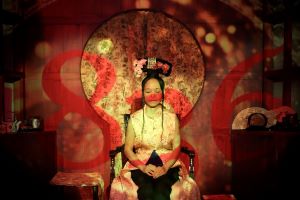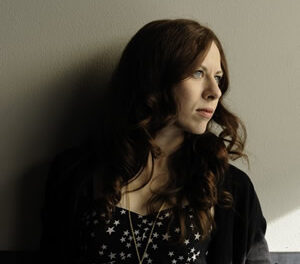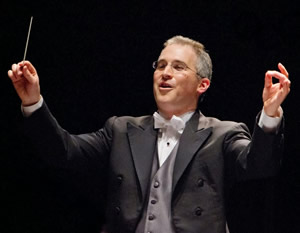I have not been engaging in Wilmington’s theatrical scene long but I’ve already had the pleasure of attending two of Big Dawg Productions‘ previous productions, once as a regular and once in the capacity as a critic. At the start of both, Artistic Director Steve Vernon informed the audience of upcoming productions, and both times The Chinese Lady came up. I was intrigued by the announcement of a serious dramatic work in a sea of comedies and wondered what Big Dawg had up their sleeve. I could tell they were proud of this particular endeavor.
Now, having finally seen it, I can confirm that they had every reason to feel that way.
Written by Lloyd Suh, The Chinese Lady tells the life story of Afong Moy, a Chinese girl who, at the age of fourteen in 1834, became the first Chinese woman to set foot on American soil. Afong Moy was sold by her father to the Carnes Brothers, who ran an “oriental export” company and displayed Moy for the public, at a fee, with some statements made about educating the American public about Chinese culture.
Afong Moy was only meant to be here two years. She died in the US in her 60s.
The Chinese Lady is structured as a series of monologues delivered by Moy to the audience. The set is designed to look like the fake Chinese room that the Carnes Brothers would have created for her. The only other character in the whole play is Atung, the adult Chinese man who translated for Moy while she was on display and saw to her needs.
The story of Moy is a profoundly tragic one, and it would have been easy for Suh to simply write a piece of dramatic prestige trauma porn, something to condemn the past at a safe distance and leave the audience with a comfortable feeling about how far we’ve come as a culture. A play that would elicit a comfortable “Wow! That was so sad, and I cried but I’m sure glad we’re not like that anymore! Haven’t we come a long way?” reaction. That would be the easy route, but the script doesn’t go the easy route. Instead, Suh leans into the discomfort rather than trying to make it more palatable. The play recreates the experience of seeing Moy on display in the 19th century. The play is staged and blocked as if you are the period audience who have paid 75 cents (50 for children) to see a real Chinese lady. But rather than just recreating the act, the play employs a few Brechtian techniques to remind the audience that they are still watching a theatrical performance. Moy verbally gives the audience context for the history happening in the background while also reminding us that she doesn’t know any of it because of her confined monotonous existence. Her monologues start out educational but grow more philosophical and existential as the years pass, informing us of Moy’s mental state as she grows up and China gets further and further away. Atung, as well, becomes a more complicated character. At the beginning of the play, he and Moy remind the audience that he is not important. We then see him grow attached to Moy, culminating in a truly fantastic monologue at the end of the first act about his dreams.
All of this is in the script, but a script is only the blueprint of a successful play. Here I am proud to report that Big Dawg’s production nailed the material. Terri Hsu’s direction understands the call for alienation in the script. Listening around me during the performance, I could hear the audience going on a journey: awkward laughter, groans, gasps, cringes (yes, I could hear people cringe), and a single sob, caught as it tried to escape. These are the reactions of a crowd in the hands of a masterful director, someone who brings them into the space and carefully guides them through an experience designed to put their emotions through the wringer. Small casts can be a rare challenge for an actor, as they have more opportunities to show their craft but also have fewer people on stage to fall back on. Thankfully, Mirla Criste and Chad Hsu both rose to the occasion as Afong Moy and Atung, respectively.
It has been a long time since I have seen a part as conceptually difficult as Afong Moy. An actress playing this part must convincingly age from a fourteen-year-old girl to a woman in her sixties before our eyes. Not only did Criste pull this off, but she even managed to do so without the aid of aging makeup; it was all through performance and costuming. In a play about looking, her ability to skillfully keep an audience arrested and then flip and remind them that they are looking was truly remarkable. Some of the best moments in the play were when Moy gets caught up in a personal monologue, remembers she has an audience, and composes herself.
Chad Hsu as Atung was no less powerful but much more understated. Atung as a character tries his best to fade into the background, to be Afong Moy’s shadow with no thoughts or opinions of his own. But he can’t, he’s a human being and he can’t make himself invisible no matter how hard he tries. There were times when Moy was monologuing and Atung just stood there downstage, but if you took a moment to look at him, he had his own internality, and it was all communicated through posture and smaller gestures, making it so much more rewarding in those rare moments when he does get to speak. The most triumphant moment of Hsu’s performance was one sequence in which Atung and Afong May acted out her visit to see president Andrew Jackson. Hsu plays Atung and Atung playing Andrew Jackson; it was a brilliant piece of acting.
Under a director this skilled and two powerful leads, the rest of the production comes together effortlessly. As I’ve hinted, the costuming does a lot to communicate the passage of time that other stagings might have done with makeup. There’s a post-intermission costume and prop change that subtly communicate that Moy is no longer owned by the Carnes Brothers. The set is the opposite. Unlike the performances and the costumes, it does not change. No matter how many decades pass, Moy’s little box remains exactly the same, balancing a comfortable familiarity with a mind-numbing, claustrophobic sameness. Costume designer Stephanie Scheu Aman and set designer Terry Collins are to be commended.
Big Dawg’s staging of Lloyd Suh’s The Chinese Lady is a confrontational, dramatic triumph: a play utilizing a cast of two, an intimate crew, and Brechtian theatrical brushstrokes to create a deeply alienating experience. It was difficult to watch, but difficult in the best way, the sort of play where the minute the audience stopped their final applause, a loud buzz of chatter erupted as everyone filed out.
The Chinese Lady continues through Sunday, June 18. For more details on this production, please view the sidebar.













